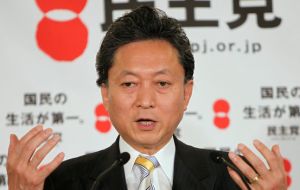MercoPress. South Atlantic News Agency
'Major win' for Japan opposition
 Yukio Hatoyama, a veteran lawmaker from a well-known political family
Yukio Hatoyama, a veteran lawmaker from a well-known political family A historic election win by Japan's opposition Democratic Party on Sunday is likely to buoy Tokyo shares on hopes for less policy deadlock, putting pressure on Japanese government bonds and the yen.
The DPJ has won 300 seats in the 480-seat lower house, ending 50 years of almost unbroken rule by the Liberal Democratic Party (LDP), NHK TV says.
The DPJ says it will shift the focus of government from supporting corporations to helping consumers and workers.
Prime Minister Taro Aso has said he will resign as head of the LDP, taking responsibility for the defeat.
Japan is suffering record unemployment and its economy is struggling to emerge from a bruising recession.
Analysts say voters blame the conservative LDP for the current economic malaise - and are angry enough to opt for change.
Reform bureaucracy
The exit polls suggest a stunning reversal of fortune for Japan's political parties, reducing the LDP to a rump in parliament, correspondents say.
Mr Aso's party has governed Japan for all but 11 months since 1955.
Official results are expected early on Monday, but a senior LDP official acknowledged that the party was heading for a “historic defeat”.
“The predictions by the media were shocking. We had doubts, but now I think they are becoming a reality,” Yoshihide Suga, deputy chairman of the LDP's election strategy council, was quoted as saying by Reuters news agency.
The DPJ leader, Yukio Hatoyama, has promised to boost welfare, reform the bureaucracy, and seek a more balanced relationship with the United States.
Mr Hatoyama is the wealthy grandson of the founder of Bridgestone tyres, whose other grandfather was a former LDP prime minister.
'Overwhelming majority'
Turnout in Sunday's election was reportedly just under 50%, slightly down from 2005 when elections saw the charismatic Junichiro Koizumi's LDP elected with a significant majority.
Japanese broadcaster NHK announced its exit polls moments after voting ended at 2000 (1100 GMT), saying they showed a major power shift in Japan.
“Our exit polls show the main opposition Democratic Party will seize more than 300 seats, way more than a majority in the lower house,” said the newsreader.
“That signals a defeat for the governing coalition.”
The LDP had 303 seats in the outgoing parliament, compared to the DPJ's 112. The projections were based on exit polls of roughly 400,000 voters.
If the DPJ were to gain such a landslide majority, it could establish a new cabinet within the next few weeks.
Voter anger
As voting closed on Sunday night, officials said turnout had been high, despite a combination of typhoon-triggered rainfall around Tokyo and a government warning that a swine flu epidemic was under way.
The DPJ already controls Japan's upper house with the support of smaller parties including the Social Democrats.
It won control of the house in July 2007, amid voters' anger at a series of scandals and the loss of millions of pension payment records.
Correspondents say voters' desire for change after so many years under the LDP was a crucial factor.
Tokyo University political science professor Takashi Mikuriya told Japanese media the election was ”more about emotions than policies. (BBC)
Analysis
By Alastair Leithead, BBC News, Tokyo
It's a massive swing. What the opposition can do now they are coming into power, and untested, is deal with the serious problem revolving around the economy and the recession.
Unemployment is at the highest level it ever has been and by the end of next year Japan will no longer be the second biggest economy in the world - that will be China.
Almost a third of the people here will be pensioners and therefore there will be fewer taxes coming in, more money going out.
It's a very difficult position that Japan is in. People have voted out a party that was in power almost without break for 50 years.
They are now looking to a new and inexperienced government to try and deal with some difficult challenges.




Top Comments
Disclaimer & comment rulesCommenting for this story is now closed.
If you have a Facebook account, become a fan and comment on our Facebook Page!